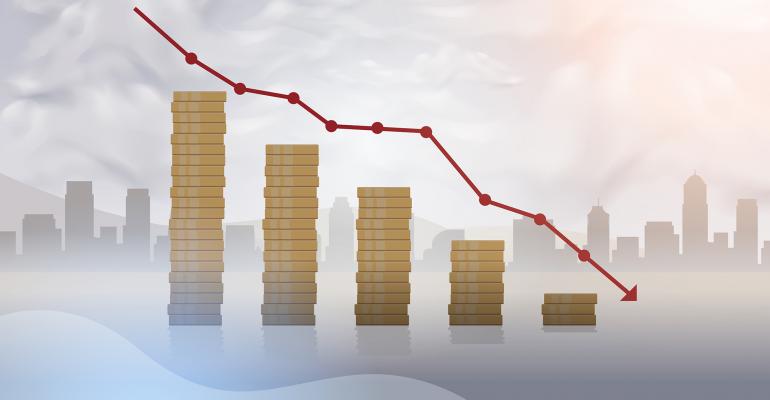In May 2022, the Federal Reserve’s Federal Open Markets Committee raised its Federal Funds rate by 50 basis points. In June, the Fed again raised the Federal Funds rate by another 75 basis points. And in mid-July, the Federal Reserve raised rates another 75 basis points. Analysts anticipate that the Fed will continue to raise rates several more times this year in an effort to fight inflation.
The Federal Reserve is taking these actions to slow the rate of inflation, which is at decades high levels. Currently, inflation is running at over 9 percent, as opposed to a target rate of about 2 percent. Food and energy costs have been large contributors to the high rate of inflation, along with global supply chain interruptions caused by the COVID-19 pandemic. Labor shortages continue, with many more open positions available than people looking for jobs. This shortage of jobs is creating pressure on wages and driving employee costs higher. Additional causes of the high inflation rate include the war in Ukraine and increased spending by the U.S. Congress.
The interest rate increases by the Fed are intended to relieve the pressure by raising the cost of borrowing money. The increase in the Federal Funds has caused a corresponding increase in U.S. Treasury rates. The 10-year Treasury rate is the rate that most affects commercial mortgage rates as most lenders price their commercial mortgages based on that index. At the beginning of 2022, the 10-year Treasury was at 1.66 percent. By June, that rate had climbed to close to 3.50 percent. The 10-year Treasury is now hovering around the 3.00 percent level. Many analysts expect the 10-year Treasury to be significantly higher by year end.
Rising interest rates have a very negative effect on commercial real estate investment and financing. Investors looking to acquire or refinance their commercial properties are seeing rates that are much higher than they were at the beginning of the year. Since higher rates cause higher monthly payments, many investors are coming up cash short when looking to acquire a new property or refinance a maturing loan.
As an example, let’s consider a borrower looking to acquire a commercial property and looking to finance the acquisition with a $5 million commercial mortgage. Assume that the lender was charging a rate of 200 basis points over the 10-year Treasury. In January, the rate on the loan might have been around 3.66 percent, with a monthly payment (based on a 25-year amortization) of $25,463. By the end of June, the rate might have been 5.50 percent, with a monthly payment of $30,705. With more of the property’s cash flow going to debt service payments, and other costs (such as labor and utilities) rising as well, many property owners are seeing a cash flow shortage. Investors who are able to raise their rents are trying to keep ahead of rising expenses. Many other investors, such as owners of rent controlled and rent stabilized apartments, are limited by what they can charge in rent. These owners are facing a growing cash flow shortage. In the case of a refinance of a maturing mortgage, many investors are finding it difficult to refinance. In the case of a new purchase, many investors are holding off as many deals are simply not financeable and don’t make economic sense to pursue.
Over the last 10 years or so, we have seen cap rates drop as rates have remained low. There is now a lot of pressure on real estate cap rates to reverse the trend and start to increase, especially for those assets that are not able to grow their rents. As an example, consider a triple net property leased long term to a credit rated tenant at a cap rate of 4.50 percent. In the past, an investor would be interested, as there was positive cash flow after debt service since rates were low. Now, with rates over 4.50 percent, an investor would lose money if he invested in this property and financed the acquisition with a commercial mortgage. Since many investments no longer cash flow adequately, we are seeing investors sit on the sidelines. They are waiting for rates to drop, which is unlikely, or for cap rates to increase, which is more likely.
Since the cap rate is defined as the return on investment for a commercial property, we would expect that cap rates would begin to climb as rates increase. The cap rate is inversely proportional to the sales price, so as cap rates in the market increase, prices will decline. While we have not seen wholesale price decreases yet, and the market remains strong, this trend will likely change as rates continue to increase. Since sales prices have not declined yet, many investors are changing their strategies and looking to purchase properties that better meet their cash flow goals. We are seeing investors shift into smaller tertiary markets where competition is weaker, value-add properties where the potential for rent increases is higher, and out-of-favor asset classes that show the ability to rebound in the near future.
The increases in market interest rates have caused a slowdown in deal activity and will continue to impact commercial real estate as we look to the future. Higher rates will cause an increase in cap rates and a corresponding drop in sales prices. We are watching the market closely for these trends.
Stephen A. Sobin is an industry veteran with almost 40 years of mortgage lending experience. He is the President and Founder of Select Commercial Funding LLC, a nationwide commercial mortgage brokerage company. Mr. Sobin is a proud member of the InterCapital Group, a nationwide alliance of commercial mortgage professionals. For more information, please visit our website at www.selectcommercial.com or email me at [email protected]





